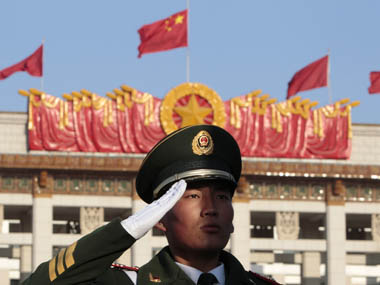In India, those who fret that governmental policy paralysis and politics and corruption are a drag on the country’s unrealised potential often look longingly at China, our trans-Himalayan neighbour, as a model of a country that “gets things done” - without the ceaseless drama of politics. Unencumbered by divisive electoral politics of the sorts we see here everyday, the China’s one-party state that brooks no dissent or ideological challenge has traditionally drawn favourable comparisons with the stodgy Indian way of muddling along and grappling with a million mutinies. It was enough to give our democracy – such as it is — a bad name. It isn’t just Indians, of course, who nurse ‘China envy’: New York Times columnist Thomas Friedman has frequently painted China’s authoritarian capitalist model (that relies on 25 wise members of the Politburo to draw up policy) as holding an advantage over the cussed gridlock that characterises US politics. A while ago, he said he “fantasised” about America being “China for a day… I mean, just one day…. where we could actually authorise the right solutions… on everything from the economy to the environment.” Yet, recent dramatic developments in the Chinese political landscape have shown up just how eerily similar it is to the chaos that passes for politics in India, and how the pillar of political stability that underwrote China’s top-speed growth of 30 years is facing its sternest challenge in a generation. Corruption in high places? Check. Political intrigue and power struggles? Check. Online rage directed at the government? Check. Bizarre coup rumours? Check. Plus, the political churn in China also features the hastily cremated corpse of a UK businessman who was evidently murdered by the wife of one of China’s leading politicians. [caption id=“attachment_274108” align=“alignright” width=“380” caption=“A paramilitary policeman salutes in front of the Great Hall of the People after a plenary session of the National People’s Congress (NPC) in Beijing. Reuters”]  [/caption] The politician at the centre of the scandal is Bo Xilai, a “princeling” (as privileged sons of high-ranking party leaders are referred to) who was on the fast track to being appointed to the powerful, nine-member Politburo Standing Committee later this year. As the Communist Party leader of Chongqing, Bo launched an enormously popular and ruthless campaign against organised crime. But controversially, he also built a ‘personality cult’ around himself by launching a ‘red’ campaign under which, among other things, government employees were required to sing patriotic songs praising China. The spectacle was a throwback to the revolutionary Mao Zedong era, but in a country where, as Prince Charles famously said, leaders resembled “appalling old waxworks” (with their uniformly coiffured and greased hair and determinedly dyspeptic facial expressions), Bo’s over-the-top attempt to build his grassroots-level populism caused deep disquiet among party leaders. Bo quickly became the leader around whom the New Left (the hardline Communists who felt sidelined after three decades of the opening up of the economy) rallied. But today, the skeletons are tumbling out of the princeling’s cupboard. Bo has been stripped of his powers and is facing an investigation that is almost certain to end his career; more sensationally, his wife Gu Kailai stands accused in the alleged murder of a Neil Heywood, a British businessman whose business relationship with Gu had evidently soured. Heywood’s body was hastily cremated, and the UK government is pressing for an investigation into his death. Yet, Bo is today being seen among sections of the Chinese people as having been martyred for his bold crackdown on crime. His fall from grace has accentuated the rift within the Communist Party over the upcoming change in the top leadership later this year. It also gave rise to outlandish rumours of a ‘coup’ after reported sightings of tanks in Beijing – whose reports were just as bizarre as the Indian ‘non-coup’ reports of last week. In another sign of the political ferment that has China in its grip, Chongqing on Wednesday witnessed clashes between police and the local populace. Although the clashes weren’t directly related to Bo’s departure, they are symptomatic of the strains on the political system at a time when the Chinese economy is facing enormous growth pressures. It was China’s political stability and the absence of open ideological wars, along with a crackdown on dissent and a cooption of the privileged, that provided the foundation for its extraordinary growth of the past two decades. That political stability is now facing its biggest challenge since the 1989 Tiananmen Square demonstrations that ended bloodily. China’s political system has often been likened to a pressure cooker without a safety valve. And today, as the pressure builds up, the same levers of authoritarian capitalism that worked to China’s advantage in good times are compounding the crisis. There’s a lesson for Thomas Friedman and for those in India who yearn to be “China for a day”: even the most ruthlessly efficient mechanisms has the seeds of its downslide inbuilt in them.
It was political stability that underwrote China’s supernormal growth of decades, Today, after a political scandal centred around a privileged politician, that stability is at risk.
Venky Vembu attained his first Fifteen Minutes of Fame in 1984, on the threshold of his career, when paparazzi pictures of him with Maneka Gandhi were splashed in the world media under the mischievous tag ‘International Affairs’. But that’s a story he’s saving up for his memoirs… Over 25 years, Venky worked in The Indian Express, Frontline newsmagazine, Outlook Money and DNA, before joining FirstPost ahead of its launch. Additionally, he has been published, at various times, in, among other publications, The Times of India, Hindustan Times, Outlook, and Outlook Traveller. see more


)

)
)
)
)
)
)
)
)



